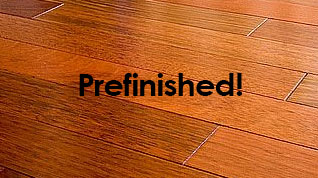Not all hardwood flooring is created equal, which is more than obvious when you look at the wide range of flooring costs out there. Why are there such differences in the cost of hardwood flooring? A lot of factors come into play that affect the final cost of your flooring, but one of the fundamental factors is the type of hardwood. You have many choices in the type of hardwood flooring you want for your home, including engineered vs. solid hardwood flooring, and unfinished vs. factory flooring. Here we break down a comparison of costs on these types of hardwood flooring.
Matchup #1 - Engineered vs. Solid Hardwood Flooring

If you ever want to take part in a lively debate, ask a homebuilder his preference between engineered vs. solid hardwood flooring. Many people in this industry have a strong feeling toward one option over the other. Here, we'll give you the information so that you can make up your own mind.
Solid hardwood flooring has been a staple flooring option for centuries, and for good reason. Wood enthusiasts love the richness of solid hardwood, which can come in many wood varieties, including highly sought-after exotic woods. Solid wood can be refinished many times (more than engineered wood), helping it to last an extremely long time. People with pets and children tend to want solid hardwood flooring because of its reputation for durability. However, most, if not all, hardwood flooring needs to (or should) be professionally installed.
Engineered hardwood flooring is made of wood layers, with the top (decorative) layer being the wood you chose, while the sub-surface layers are made of what some people might call "scrap" wood. Scrap isn't really a fair word here, though, because the three to five layers of hardwood beneath that decorative surface are bonded together under tremendous heat and pressure, providing you with an extremely durable, long lasting floor.
Because of the way engineered hardwood is made, it's by far a more environmentally friendly product than solid hardwood, seeing that one tree of the desired ornamental wood can supply a lot more flooring than in solid hardwood.
Engineered hardwood can be installed virtually anywhere in your home because its layers help withstand moisture. This type of flooring can also be installed over radiant floor heating.
If budget is your chief determining factor, then the clear winner is engineered hardwood flooring. On average, you'll find you spend less on engineered hardwood than you do on solid hardwood. The fact that you can install it (on your own, if you choose) essentially anywhere in your home just so happens to be an added benefit.
When might you prefer to go with hardwood? If you anticipate wanting the same floor for decades upon decades (like passing your family home onto your children) then hardwood not only will likely outlast engineered hardwood, but also adds to the "history" of your home.
Winner of comparison of hardwood scenario 1 – Engineered hardwood.
Click Here to view our entire line of Engineered Hardwood Flooring.
Click Here to view our entire line of Solid Hardwood Flooring.
Matchup #2 - Unfinished vs. Factory (Prefinished) Hardwood

Another area where your cost of hardwood flooring can drastically change is in your choice between unfinished and factor (prefinished) hardwood. Here are the differences:
There was a time when all you could get was unfinished hardwood. That meant you'd order your hardwood, have it installed, and then have it sanded flat and refinished (multiple times) with urethane-based finish. This process took days, required you to stay out of that room, and usually your home, during the process, and prevented you from being able to use your room for quite some time. Some folks say you can move your furniture back into that space in a few days, but in reality, flooring with an oil-based polyurethane finish is susceptible to scraping for weeks, until the finish has fully cured.
There are reasons you'd want an unfinished hardwood. If you're looking for a specific stain color you can't find in a prefinished option, then you'll want unfinished hardwood. Or, if you prefer a super wide width panel, or square edged hardwood, those often don't come in prefinished flooring.
But a lot can go wrong when you have your wood finished on-site. Your family's health is at risk, because of the vapors from polyurethane resins and solvents. Also, you have to worry about dust and errant hairs, and won't enjoy the benefits of a one-session installation.
Prefinished hardwood, on the other hand, can take all of two hours or so to install. Factory hardwood finishes are extremely durable and often come with a lifetime warranty, because the manufacturers have complete control of the environment in which the finish is being applied. Most manufacturers have such a wide variety of prefinished styles that you'll find a choice that matches your preference; however, it is true that your options are far more encompassing when you choose the unfinished route.
So which hardwood product costs less? This is a bit trickier than the engineered vs. solid breakdown. When you first look at prices, you'll see that the unfinished hardwood comes in at a lower price. But looks can be deceiving. Don't forget to factor in all finishing costs (and, if you feel like it, factor in the inconvenience of not being able to use your floor immediately), and you'll soon realize that the final cost of unfinished hardwood usually surpasses the one-time cost of prefinished, factory hardwood.


